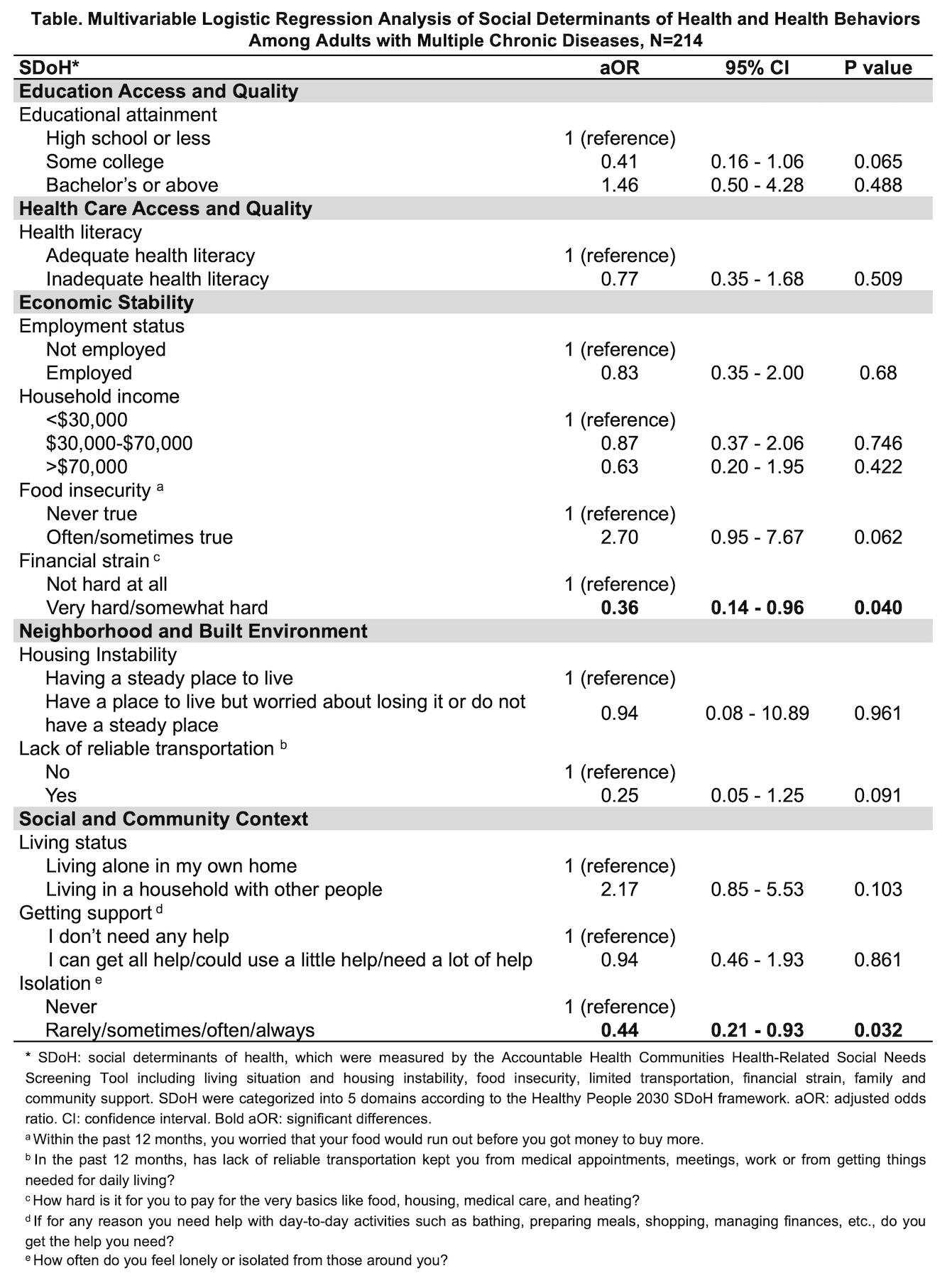Final ID: P2157
Social Determinants of Health and Health Behaviors Among Adults with Multiple Chronic Diseases: The LINKED-HEARTS Program
Abstract Body: Introduction: Social determinants of health (SDoH) contribute to cardiovascular outcomes and health disparities. Despite a recent focus on structural drivers of health disparities, the associations between SDoH and health behaviors among adults with multiple chronic diseases remains understudied.
Objectives: To examine the association between SDoH and health behaviors in the “LINKED-HEARTS” (a Cardiometabolic Health Program LINKED with Community Health WorkErs and Mobile HeAlth TelemonitoRing To reduce Health DisparitieS) Program.
Method: We conducted a cross-sectional analysis using baseline data from the “LINKED-HEARTS” Program, an ongoing cluster-randomized controlled trial of adults with uncontrolled hypertension in addition to diabetes or chronic kidney disease (CKD). The outcome was adherence to three or more cardiometabolic health promoting behaviors: healthy diet (Mediterranean Eating Pattern for Americans scale), moderate or vigorous physical activity (≥ 150 minutes/week), non-smoking, and recommended sleep duration (7–9 hours/night). The exposures were SDoH (Table). To examine the association between SDoH and health behaviors (> 3 vs. ≥ 3), we conducted a multivariable logistic regression analysis, adjusting for demographics (age, sex, race/ethnicity), marital status, and general health status. Adjusted odds ratios (aOR) and 95% confidence intervals (CI) were calculated.
Results: The study included 214 adults with hypertension in addition to diabetes or CKD, with a mean age of 64 years (±SD 12.3), of whom 61.1% were female, 52.8% were non-Hispanic Black adults. Of the adults included, only 28% (n=60) reported engaging in three or more health behaviors. Participants who reported experiencing any financial strain were 64% less likely to adhere to three or more health behaviors (aOR 0.36, 95% CI: 0.14-0.96) compared to those who never experienced financial strain (Table). Additionally, those who reported frequent social isolation were 56% less likely to adhere to ≥ 3 health behaviors (aOR 0.44, 95% CI: 0.21-0.93) compared to those who reported no feelings of social isolation.
Conclusion: Financial strain and social isolation were associated with fewer health behaviors among adults with multiple chronic diseases. These findings indicate the need to continually assess and address SDoH in interventions aimed at improving lifestyle behaviors and cardiovascular health outcomes in high-risk populations.
Objectives: To examine the association between SDoH and health behaviors in the “LINKED-HEARTS” (a Cardiometabolic Health Program LINKED with Community Health WorkErs and Mobile HeAlth TelemonitoRing To reduce Health DisparitieS) Program.
Method: We conducted a cross-sectional analysis using baseline data from the “LINKED-HEARTS” Program, an ongoing cluster-randomized controlled trial of adults with uncontrolled hypertension in addition to diabetes or chronic kidney disease (CKD). The outcome was adherence to three or more cardiometabolic health promoting behaviors: healthy diet (Mediterranean Eating Pattern for Americans scale), moderate or vigorous physical activity (≥ 150 minutes/week), non-smoking, and recommended sleep duration (7–9 hours/night). The exposures were SDoH (Table). To examine the association between SDoH and health behaviors (> 3 vs. ≥ 3), we conducted a multivariable logistic regression analysis, adjusting for demographics (age, sex, race/ethnicity), marital status, and general health status. Adjusted odds ratios (aOR) and 95% confidence intervals (CI) were calculated.
Results: The study included 214 adults with hypertension in addition to diabetes or CKD, with a mean age of 64 years (±SD 12.3), of whom 61.1% were female, 52.8% were non-Hispanic Black adults. Of the adults included, only 28% (n=60) reported engaging in three or more health behaviors. Participants who reported experiencing any financial strain were 64% less likely to adhere to three or more health behaviors (aOR 0.36, 95% CI: 0.14-0.96) compared to those who never experienced financial strain (Table). Additionally, those who reported frequent social isolation were 56% less likely to adhere to ≥ 3 health behaviors (aOR 0.44, 95% CI: 0.21-0.93) compared to those who reported no feelings of social isolation.
Conclusion: Financial strain and social isolation were associated with fewer health behaviors among adults with multiple chronic diseases. These findings indicate the need to continually assess and address SDoH in interventions aimed at improving lifestyle behaviors and cardiovascular health outcomes in high-risk populations.
More abstracts on this topic:
Activated CD8+HLA-DR+ T Cells as Immune Biomarkers of Metabolic Dysfunction and Cardiovascular Risk in Prediabetes
Alrashed Fatema, Alsaeed Halemah, Alturaiki Wael, Akhter Nadeem, Alosaimi Bandar, Almutairi Saeedah, Mubarak Ayman, Al-mulla Fahd, Ahmad Rasheed
An intensive longitudinal study of daily minority stressors and home blood pressure among sexual minority and heterosexual siblingsXu Zidu, Lopez Veneros David, Caceres Billy

